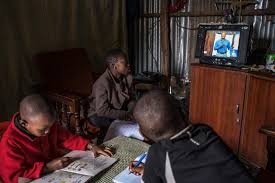Five-year-old Kenyan student Miguel Munene sits between his parents, holding their hands as he watches cartoon characters teaching him to pronounce “fish”.
The television has replaced Munene’s teachers and classmates after the government shut schools indefinitely in March to curb the spread of the novel coronavirus. They are closed until at least January.
Many children don’t have the option to learn online - the United Nations children’s agency UNICEF says at least half of sub-Saharan Africa’s schoolchildren do not have internet access.
So some, like Munene, watch a cartoon made by Tanzanian non-profit organisation Ubongo, which offers television and radio content for free to African broadcasters.
“Other programmes are just for fun, but Ubongo is helping children,” Miguel’s mother Celestine Wanjiru told Reuters.
“He can now differentiate a lot of shapes and colours, both in English and Swahili.”
In March, programmes by Ubongo - the Kiswahili word for brain - were broadcast to an area covering about 12 million households in nine countries, said Iman Lipumba, Ubongo’s head of communications. That rose to 17 million in 20 countries by August.
“The COVID-19 pandemic has really forced us to rapidly grow,” Lipumba said.
A group of artists, innovators and educators set up Ubongo TV in Tanzania in 2014. It has received around $4 million in grants since, and earned $700,000 from YouTube, product sales, character licensing, and co-production of programmes.
For Munene and other schoolchildren, programmes like Ubongo’s are their only option to learn for now.
Kenya’s education ministry says schools can only reopen when the number of COVID-19 cases drops substantially.
Kenya has had over 36,000 confirmed cases and more than 620 deaths, health ministry data showed.
“You have the kid with you all the time so when you have such programmes, they are a big help,” Patrick Nyaga, Miguel’s father, a security guard, told Reuters.
But television cannot completely replace teaching.
“The way the children learn through programmes is different (from) the way they interact with others and teachers,” Nyaga said. “We are hoping that they open soon.”
Latest Stories
-
Full text: Mahama inaugural speech
4 minutes -
CAF increases CHAN prize money to $3.5m
14 minutes -
Collins Adjei Kuffuor writes: Mahama’s inaugural speech – a blueprint for Ghana’s future
39 minutes -
Ghana is open for business again – Mahama assures business communities
50 minutes -
Sege MP holds dinner with TOSA 96
1 hour -
Collins Adjei Kuffuor writes: Ghana’s tax system needs urgent reform
1 hour -
Rebecca Tweneboah Darko: ‘I love you King Promise, marry me’
2 hours -
Who becomes Mahama’s minister for Tourism, Arts and Culture?
3 hours -
Dagbani Wikimedia User Group honours 11 Wikimedians for excellence in 2024
3 hours -
Rebuilding of Kantamanto must meet fire safety standards – GNFS
3 hours -
Centre for Social Justice applauds Mahama’s return as President
3 hours -
CDKN trains early career researchers on knowledge brokering, science communication
4 hours -
Council of State aspirant congratulates President Mahama on landmark victory
4 hours -
Punish ASP Jalil for assaulting DSP Nanka Bruce – Adam Bona to Mahama
4 hours -
Adam Bona raises concerns over sudden promotions at EOCO
4 hours

